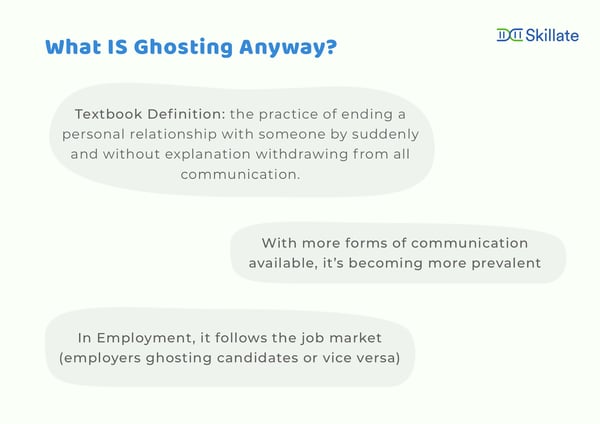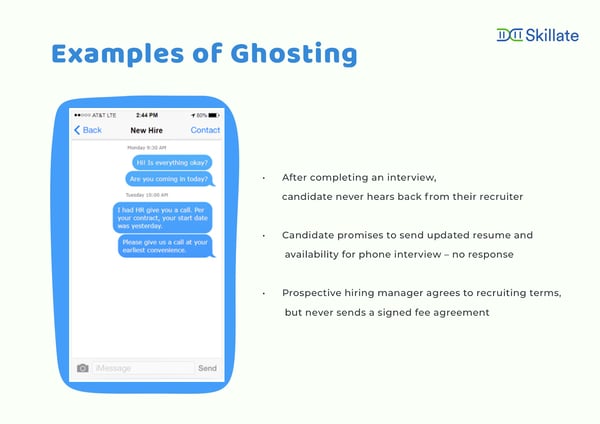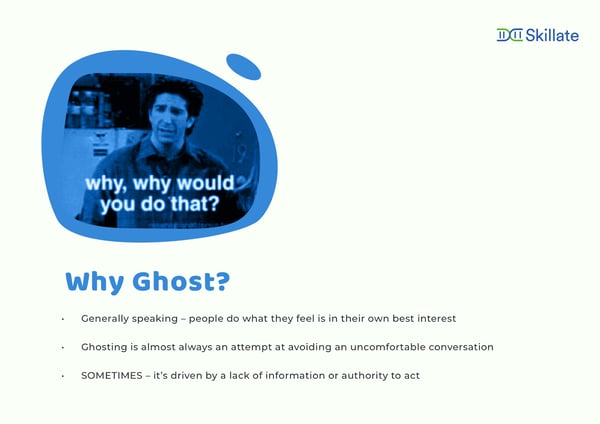
And much like every problem in online relationships, ghosting arises because of issues with commitment. Also, just like problems in any relationship, ghosting is also a two-way process. Both candidates and recruiters are responsible in some way or the other. And even though both parties have their own sets of reasons, the underlying cause remains the same.
The competitive market in the recruitment space has made ghosting a top concern for recruitment teams around the world. With more and more numbers of employees and workers leaving their offices in silence, let’s have a look at the root cause of ghosting in the recruitment world.
Sleeping with your phone is a term that a lot of us will be familiar with. With technology keeping us connected seven days a week, the same connectivity can often overwhelm us. In a strange paradox, the many lines of connectivity have resulted in a lot less communication. It’s no surprise that with more technology, ghosting is also quickly becoming the new normal.
Whenever a candidate or a recruiter suddenly stops communicating midway through the hiring process, without any explanation, this phenomenon is called ghosting.
In a recent study by Indeed, 83% of recruiters said candidates had ghosted them. Sixty-nine percent of them said ghosting has become increasingly commonplace in the past few years.
Another survey by Clutch discovered that 41% of workers didn’t have a problem with candidates ghosting employers, but those same people said an employer ghosting a candidate was unacceptable. Of the workers who deemed ghosting acceptable, they stated the most common reasons include accepting another job offer or deciding the role was not a good match.

As a recruiter, if your candidate is not showing up in the interview, not replying to your follow-up voicemails, and even worse, not joining on the first day after having accepted the offer, chances are you are being ghosted.
If you are a candidate who never heard back after an interview, or if you are a recruiter who never received the resume that the candidate was just going to send, chances are you have been ghosted. A sudden dearth of communication, a lack of commitment towards a job, and an unexpected change of tone are all signs of a potential ghosting candidate. However, a lot of times, a justified end to a conversation is confused with ghosting.
For example, if you are trying to cold call a talent for the first time and he or she doesn’t respond. Or if you are a candidate who has been clearly rejected from a job, but you are still trying to contact the recruiter, then the onus is simply on you. These instances, where the end of the conversation has been clearly indicated by one side, would not be considered ghosting.
Even though generally associated with non-answering candidates and recruiters, ghosting includes many more instances. Candidates, recruiters, and even established employees can indulge in ghosting. Ghosting can happen in various stages of the recruitment process or even employment duties.
When a candidate or a worker ghosts an employee, it usually means that he or she has found a better opportunity and is not comfortable saying that to the recruiter’s face. This indicates that the talent is no longer looking out for new job opportunities.
However, when a recruiter suddenly stops communicating with a talent, in between a hiring process, this usually signals that he or she doesn’t find the candidate the right fit or they have been rejected by their hiring managers. Basically, the recruiter has found a suitable replacement for the talent and is hesitant to communicate it directly with the candidate. This can be due to cultural fitment, payment issues, skill matching, or simply a long delay in the hiring process.
Here are a few instances of ghosting that can happen at various steps of the recruitment cycle:

Perhaps the most common instance of ghosting, not responding to a follow-up interview calls or emails can happen due to various reasons. Mass mailers or job opportunities sent without proper targeting is the most prevalent reason for not getting a response.
A candidate who thinks that the recruiter has not bothered to check his or her qualifications before sending an opportunity would also not be bothered to reply. Other instances can include not being interested in the company or profile after thorough research, or simply not receiving the follow-up email or call.
No-showing for an interview, whether in the initial rounds or at later stages, can be considered under this category. A lot of times, the reason for this can be the candidate experience of the first round of discussion. If a candidate thinks that they were not respected enough, or if there is some confusion in their head regarding the job role, they might choose to skip the next round of the interview. Other instances can include a lack of clarity about the interview process or simply forgetting the time of the next round.
Perhaps the most embarrassing situation for a recruiter is when the candidates accept the offer letter, promises to join the company on a given date, and then simply doesn’t show up on the designated day.
A survey by Indeed reported that 22% of candidates have taken the offer and failed to show up for their first day. Among employers, that seems to be more widespread. Sixty-five percent of employers report no-shows on their first day of work. Finding another opportunity in between the offer and the joining date is the primary reason for this occurrence.
This happens when a candidate makes up his mind to quit a job after he or she has joined an organization. In the initial days, if a candidate thinks that the actual job is distinctly different from the job description, they may become disinterested in the profile.
Even in cases where the candidate believes that they are not the right cultural fit, or have a difficult reporting manager, a candidate can try to make his way out of an organization. Since the candidate has already joined and is now bound with a contract, he or she chooses to put a lack of effort and low-quality output before calling it a day.
Pretty similar to the above case in terms of reason, this instance is worse because of the lack of acknowledgment. In rare cases, an employee (recent or old) can decide to quit a company without serving his notice period or even apprising the company.
Especially in economies like the US where employment is subject to will, it’s more common practice to find an employee who leaves for the day and is never heard from again. A lack of appreciation or disrespect for the employee or a better job opportunity can be the reason for this behavior.
With so many varied forms of ghosting, the natural question to ask is why do candidates ghost recruiters in the first place?
Unfortunately, the answer to this question also comes naturally. The human brain, from a biological perspective, is wired as such that it wants to move from pain to pleasure. So whenever a candidate thinks that there is a less preferable option in hand, they would like to move toward the more pleasurable one.

The most common reason for ghosting is our natural tendency to avoid confrontation. When we think we need to respond negatively to a situation or person, we tend to find the escape route. It is, therefore, the job of the recruiter to ensure that it is clearly communicated to the candidate that even a negative response is an acceptable response.
Another common example of moving towards pleasurable pastures comes when candidates find better job opportunities. A lot of times, a talent might say yes to an offer or even join a company, but if they find a significantly better opportunity, it makes sense for them to take care of their own interests and accept the alternate offer.
Candidate experience both in terms of tangible (monetary) and intangible aspects play a key role in the occurrence of ghosting. Paying competitive salaries and providing additional employee benefits are hygiene features for modern companies. Employee experience is a tool that can give an advantage to organizations when it comes to Ghosting.
A lot of times, candidates simply haven’t made up their minds in terms of going ahead with the process. Maybe they are negotiating other offers or are simply confused on whether they see themselves fit for the organization or the role. Lack of clarity or simply forgetting about the next process, are genuine reasons for candidate ghosting.
With ghosting becoming the new normal, companies need to rethink their hiring strategies in order to avoid it. Here are some points to keep in mind when addressing ghosting:

Having more transparency in the hiring process and clearly communicating the stage of the application with candidates can be a solid strategy to reduce candidate ghosting. Not only does this improve the candidate experience, but it also encourages similar transparent practices from the candidates.
Keeping candidates engaged in the period between offer roll-out and joining date is a method more and more organizations are opting for. This can be done by sending out the company’s latest collaterals, PR, blogs, and other forms of external communications to keep the candidate engaged.
Asking them to join a standup meeting even before their hiring date and providing an in-depth understanding of their job roles are other ways of minimizing ghosting. Some companies are even offering hardware such as laptops way before the joining date to improve the onboarding process. Onboarding buddies and team outings can be other effective strategies.
The problem of overcommitting happens more from the recruiters’ side. Recruiters often with the best of intentions, promise candidates of referring them to certain openings, or with coming back to them on certain dates. Recruiters should stick to the mantra of under-promising and over-delivering for all hiring processes.
Since we have already discussed the natural tendency of humans to escape when faced with confrontation, it is better that recruiters themselves provide an emergency escape to the candidates. Recruiters need to assume that there is always a chance that a candidate might not respond to his or her messages. In this case, they should provide an automatic end to the conversation just in case. If you give an ultimatum like a reply-by date, you can help kill ghosting even before it appears.
Candidate ghosting is a problem that has haunted both sides: candidates and recruiters over the years. Having empathy with each other, taking the high road, and understanding natural human tendencies can help us cope up with this issue. Using traditional manual processes is yet another reason for the process to be slow and non-transparent. This in turn increases the communication gap and thus ghosting in the workplace.
Cutting-edge technology players that use AI are transforming the recruitment process globally. Solutions like chatbots, AI-powered staffing software with automated matching, automated resume parsing, and indexing, automated interview scheduling are becoming part of the daily processes of recruitment in a world that is continuously adopting AI.
Organizations that step up their game and invest in technology to improve transparency in processes and candidate experience are the ones who will lead the way in the future.
Sreshtha specializes in AI and technology-based subjects and heads the content marketing efforts at Skillate. He holds a Master's in Communication and likes to read and cook in his free time.
If you've ever read a compelling article or book by a public figure and thought, “This is...
.png) by Shreya Mattoo
by Shreya Mattoo
Performance reviews can turn out to be a stressful event for both employees and managers.
 by Charles Harden
by Charles Harden
You would never believe the things we were doing just a few years ago to get reviews.
 by Jed Fudally
by Jed Fudally
If you've ever read a compelling article or book by a public figure and thought, “This is...
.png) by Shreya Mattoo
by Shreya Mattoo
Performance reviews can turn out to be a stressful event for both employees and managers.
 by Charles Harden
by Charles Harden


